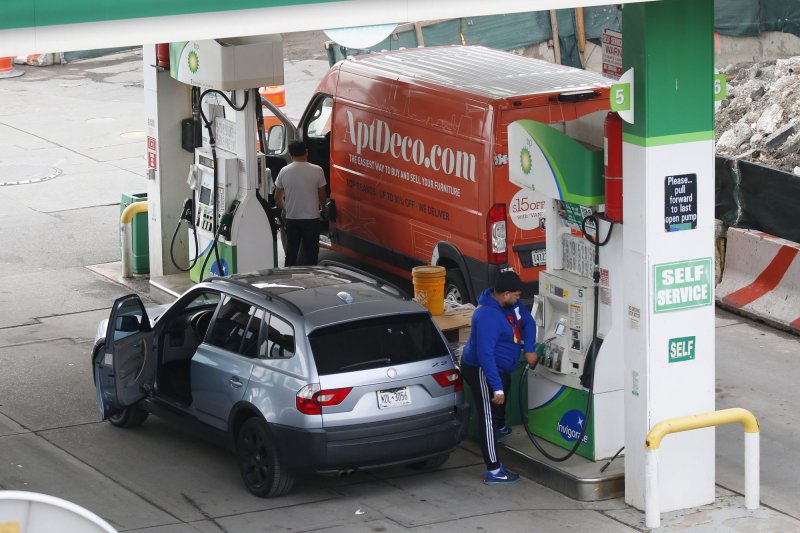1 of 4 | The price for a gallon of gasoline surpasses $5 per gallon at a gas station in New York City on Monday. Since the start of the Russian invasion of Ukraine, the national average price of gasoline has just surpassed $4 per gallon in the U.S. for the first time since 2008. Photo by John Angelillo/UPI |
License Photo
March 7 (UPI) -- The White House has sent top officials to meet with Venezuelan leaders as lawmakers in the United States announced a bipartisan deal to ban Russian oil amid surging gas prices.
The administration of President Joe Biden is considering softening sanctions imposed on Venezuela in 2019, CNN reported. Easing the sanctions could allow Venezuela to increase its oil production and exports to meet world energy demands.
Juan Gonzalez, the National Security Council Director for the Western Hemisphere, and Roger Carstens, the U.S. special presidential envoy for hostage affairs, are among the group sent to Caracas, sources told the outlet.
It marks the highest-level visit of U.S. officials to Venezuela, an ally of Russia, since the United States closed its embassy and severed ties with the government of President Nicolás Maduro, which has a history of significant human rights abuses as noted by the State Department.
U.S. Secretary of State Antony Blinken said Sunday that the Biden administration was considering the possibility of banning Russian oil imports. However, without a replacement for Russian oil, energy prices worldwide could soar to record levels.
"When it comes to oil, Russian oil, I was on the phone yesterday with [President Joe Biden] and other members of the cabinet on exactly this subject," Blinken said.
"We are now talking to our European partners and allies to look in a coordinated way at the prospect of banning the import of Russian oil while making sure that there is still an appropriate supply of oil on world markets."
His comments came after Ukrainian President Volodymyr Zelensky met with members of the U.S. Congress on Saturday and asked lawmakers to stop buying Russian oil, which would be "even more powerful than" blocking Russia from the Society for Worldwide Interbank Financial Telecommunication.
A bipartisan group of four powerful members of the House and Senate said in a statement Monday that they had reached a deal to draft legislation banning Russian oil.
The statement was released by Kevin Brady, the Republican leader of the House Ways and Means Committee, and the committee's chair Richard E. Neal, a Democrat. Sen. Mike Crapo, the Republican leader of the Senate Finance Committee, and the committee's chair Sen. Ron Wyden, a Democrat, were also a part of the agreement.
"As Russia continues its unprovoked attack on the Ukrainian people, we have agreed on a legislative path forward to ban the import of energy products from Russia and to suspend normal trade relations with both Russia and Belarus," the joint statement reads.
"Taking these actions will send a clear message to Putin that his war is unacceptable and the United States stands firmly with our NATO allies."
The lawmakers said that the legislation would give Biden the authority to further increase tariffs on products from Russia and Belarus and require the U.S. trade representative to seek suspension of Russia's participation in the World Trade Organization (WTO) and halt Belarus' WTO accession.
The price of Brent crude oil, the global benchmark, briefly rose above $130 per barrel on Monday to their highest level since 2008, according to NPR. Prices have been quickly rising since Russia invaded Ukraine last month.
Gasoline prices at the pump rose to a national average of $4.06, just shy of the highest level recorded in 2008, according to the American Automobile Association.















